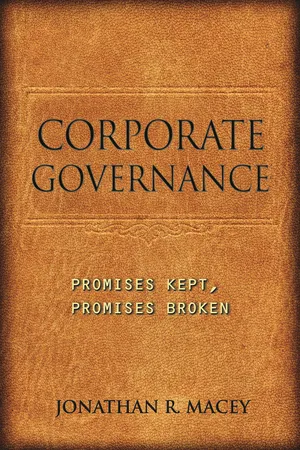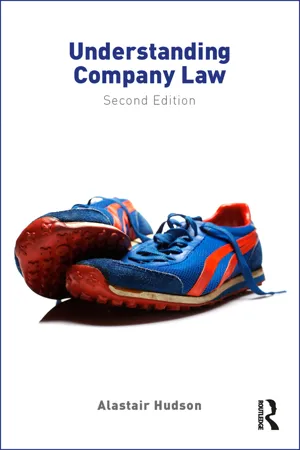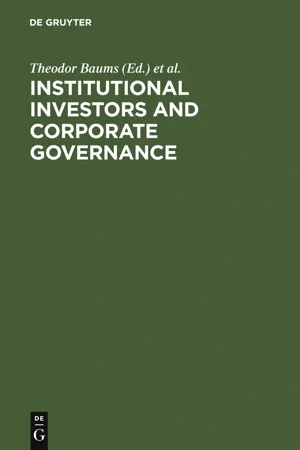Business
Stockholder Voting Rights
Stockholder voting rights refer to the ability of shareholders to participate in corporate decision-making by voting on key matters such as electing the board of directors, approving mergers and acquisitions, and other significant company actions. Each share typically grants the holder one vote, allowing shareholders to have a say in the direction and governance of the company.
Written by Perlego with AI-assistance
Related key terms
1 of 5
4 Key excerpts on "Stockholder Voting Rights"
- eBook - PDF
- Richard Mann, Barry Roberts(Authors)
- 2019(Publication Date)
- Cengage Learning EMEA(Publisher)
These corporate governance provisions of the Dodd-Frank Act are discussed in this chapter, Chapter 36, and Chapter 39. The structure and governance of corporations must adhere to incorporation statute requirements. Therefore, in this chapter we discuss the rights, duties, and liabili- ties of shareholders, directors, and officers under these statutes. ROLE OF SHAREHOLDERS The role of the shareholders in managing the corpo- ration is generally restricted to the election of direc- tors, the approval of certain extraordinary matters, the approval of corporate transactions that are void or voidable unless ratified, and the right to bring suits to enforce these rights. VOTING RIGHTS OF SHAREHOLDERS [35-1] The shareholder’s right to vote is fundamental to the con- cept of the corporation and its management structure. In most states, a shareholder is entitled to one vote for each share of stock that she owns, unless the articles of incorporation provide otherwise; the articles may provide for more or less than one vote for any share. In addition, incorporation statutes generally permit the issuance of one or more classes of nonvoting stock, as long as at least one class of shares has voting rights. Shareholder Meetings [35-1a] Shareholders may exercise their voting rights at both annual and special shareholder meetings. A 2010 amend- ment to the Revised Act permits a corporation’s board of directors to authorize shareholders to participate in annual and special shareholder meetings by means of remote communication, such as over the Internet or through telephone conference calls. Under the Revised Act, annual meetings are required and must be held at a time fixed by the corporation’s bylaws. If the annual shareholder meeting is not held within the earlier of six months after the end of the corporation’s fiscal year or fifteen months after its last annual meeting, any shareholder may petition and obtain a court order requir- ing that a meeting be held. - eBook - PDF
Corporate Governance
Promises Kept, Promises Broken
- Jonathan R. Macey(Author)
- 2008(Publication Date)
- Princeton University Press(Publisher)
Unless shares had voting rights attached to them, outsiders would have no incentive to pay a premium for control that would benefit all share- holders such as the one described above. In light of the complexities and conflicts that mark shareholder voting, it makes sense that voting is used merely to supplement, rather than dis- place, board power. Just as republican forms of government characterized by divided power within a system of checks and balances are superior to direct democracy, so too are corporate governance systems in which the actions of shareholders are strictly limited and tempered by other corpo- rate governance institutions, boards of directors, management, market forces, contract, fiduciary duties, and corporate charters. The bottom line, then, is that shareholder voting is not a panacea for corporate governance problems any more than are boards of directors or the market for corporate control. At best, they are small parts of an ex- tremely complex corporate governance system, whose success does not depend on any single factor. - eBook - ePub
- Alastair Hudson(Author)
- 2017(Publication Date)
- Routledge(Publisher)
Shareholders’ rightsIntroduction
This chapter is concerned with the rights of shareholders. The greater part of this chapter is concerned with the way in which minority shareholders can protect themselves against the actions of the majority. This is at the heart of the law on shareholder rights because the basic proposition is that the majority shareholders can vote for whatever they want, and therefore the most interesting legislation and case law have related to the minority shareholders trying to resist a decision of the majority. Two further issues are also considered: first, the power to remove directors and, second, the legal basis on which dividends are paid to shareholders. Chapter 4 considered the rights of shareholders as they relate specifically to the company’s constitution.At the outset, we should remind ourselves of how a company functions in practical terms, and how company law interacts with that. In Chapter 6 we considered the operation of the company, and in Chapter 5 we considered the various forms of shareholding in the company. In those chapters we learned that different classes of shareholder have different types of rights and also that a large part of the company’s business is conducted formally at the annual general meeting. Otherwise, the company is controlled on a day-to-day basis by the directors (and other senior management outside the board of directors if it is a large company).The operation of any trading company will involve making choices between, for example, investing for the long-term benefit of the business or generating short-term profits that can be distributed among the shareholders. Therefore, there may be situations in which individual shareholders, or even groups of shareholders, feel that they have been badly treated either by the directors or by the votes of other shareholders. For example, the directors may wish to retain a year’s profit in the business to invest in its future growth, instead of paying it out to the shareholders in dividends; whereas some of the shareholders may prefer to have that profit paid out so that they can receive dividends out of those profits in the short term. This will clearly generate conflict between directors and shareholders, or between different groups of shareholders. Different groups of shareholders may have different opinions as to the best future for the company and therefore one group of shareholders may vote at an annual general meeting for a course of action that is harmful to the interests of another group of shareholders. Again, this will generate conflict. - Theodor Baums, Richard M. Buxbaum, Klaus J. Hopt, Theodor Baums, Richard M. Buxbaum, Klaus J. Hopt(Authors)
- 2011(Publication Date)
- De Gruyter(Publisher)
They could be made cognizant of their rights' economic value if there were competitive bidding on the demand side. Indeed some sort of vote trading among shareholders themselves may already occur in cases where voting really matters, e.g. in takeover battles, bail-out situations and the like. In German corporations major shareholders interested in gaining a majority sometimes try to come to an understanding with other, uninterested 59 but befriended shareholders to the effect that the parties are to coordinate their voting behavior. 60 We need not discuss here whether the almost universal condemnation of vote buying is an efficient solution 61 , because it does not affect the question of whether we should allow competitive bidding for voting rights by financial intermediaries. The incentive to bid for votes - and the incentive to cast the vote in the first place, for that matter - are inextricably linked to the specific risk bearing of residual claimants. 62 I have pointed out earlier why, some rather technical difficulties aside 63 , competition among professional supp-liers of financial services fails to come about. It is only banks that are able to realize the economic value of voting rights to an extent that (at least) compen-sates them for the costs of bidding. Even if banks did not enjoy this comparative advantage because they were stripped of most of their equity holdings, a free rider problem would remain. To bid successfully for a voting block, someone has to take the lead, giving others a free ride. 64 59 If the other stockholder is himself interested to gain influence, the transaction cannot even economically be said to be a sale, because there is no exchange but rather a pooling of resources. 60 This is almost common practice where a company's by-laws put a ceiling on the number of votes which a shareholder may cast irrespective of the number of shares he owns, thereby abrogating the one share one vote principle.
Index pages curate the most relevant extracts from our library of academic textbooks. They’ve been created using an in-house natural language model (NLM), each adding context and meaning to key research topics.



